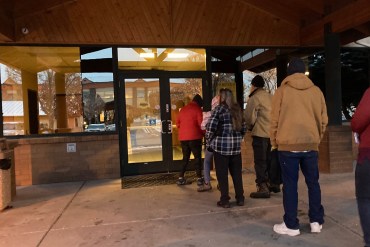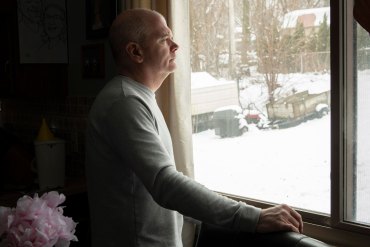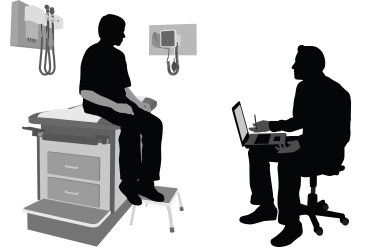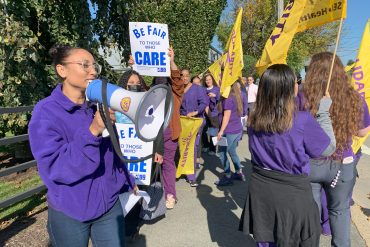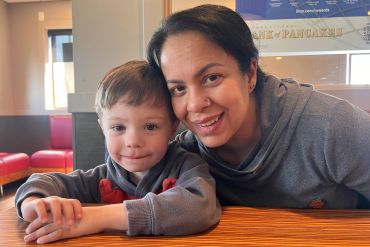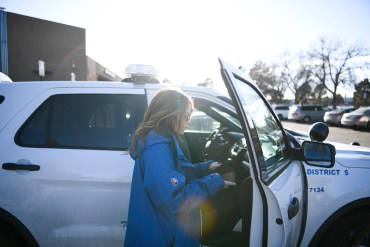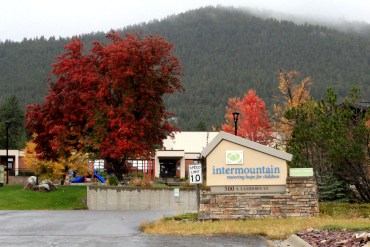Stimulant Users Are Caught in Fatal ‘Fourth Wave’ of Opioid Epidemic
The migration of fentanyl into illicit stimulants such as cocaine is especially dangerous for people who are not regular opioid users. That’s because they have a low tolerance for opioids, putting them at greater risk of an overdose. They also often don’t take precautions — such as not using alone and carrying the opioid reversal medication naloxone — so they’re unprepared if they overdose.
Patients Couldn’t Pay Their Utility Bills. One Hospital Turned to Solar Power for Help.
Doctors in Boston got tired of writing letters to utility companies asking for assistance for their medically vulnerable patients who need power and heat to stay healthy. So a hospital decided to share the power its solar panels generate with patients who needed help with their electricity and gas bills.
Nursing Homes Fell Behind on Vaccinating Patients for Covid
Last winter, only 4 in 10 nursing home residents got an updated covid vaccine. The low uptake leaves a fragile population vulnerable. Some industry watchdogs say it could be a sign of eroding trust between nursing home residents and providers.
After Congress Ended Extra Cash Aid for Families, Communities Tackle Child Poverty Alone
The child tax credit passed by Congress at the height of covid has expired, but states and localities are trying to fill the gap with their own programs and funding. In Michigan, Rx Kids already covers every family with a new baby in Flint. Now, other communities aim to follow.
For People With Opioid Addiction, Medicaid ‘Unwinding’ Raises the Stakes
Medications such as methadone can cut the risk of a fatal opioid overdose in half. Medicaid covers the medication. But as state Medicaid programs reevaluated coverage of each enrollee following a pause in disenrollments during the covid-19 pandemic, some patients lost a crucial pillar of their sobriety.
In Montana, 911 Calls Reveal Impact of Heat Waves on Rural Seniors
State and local governments are struggling to keep up with the increasing burden of heat-related illness as summers get hotter because of climate change. In Missoula County, Montana, officials are working with researchers to understand trends in heat-related 911 calls.
The Politics Holding Back Medicaid Expansion in Some Southern States
Ten states have not expanded Medicaid, leaving 1.5 million people ineligible for the state and federal insurance program and also unable to afford private insurance. Seven of those states are in the South, where expansion efforts may have momentum but where lawmakers say political polarization is holding them back.
Louisiana Reclassifies Drugs Used in Abortions as Controlled Dangerous Substances
Louisiana lawmakers have added two drugs commonly used in pregnancy and reproductive health care to the state’s list of controlled dangerous substances, a move that has alarmed doctors in the state.
Before Michigan Legalized Surrogacy, Families Found Ways Around the Ban
Until this spring, Michigan was the only state that had a broad criminal ban on surrogacy. Many families say that left them in limbo: forcing them to leave the state to have children, finding strangers on Facebook who would carry their child, or going through the legal hassle of having to adopt their biological children.
Many Young Adults Who Began Vaping as Teens Can’t Shake the Habit
New data on substance use among young adults suggests that many former teen e-cigarette users are continuing the habit.
Could Better Inhalers Help Patients, and the Planet?
Puff inhalers can be lifesavers for people with asthma and other respiratory diseases, but some types release potent greenhouse gases that contribute to climate change. That, in turn, worsens wildfires, contributes to air pollution, and intensifies allergy seasons — which can increase the need for inhalers. Some doctors are helping patients switch to more eco-sensitive inhalers.
Unsheltered People Are Losing Medicaid in Redetermination Mix-Ups
Some of the nearly 130,000 Montanans who have lost Medicaid coverage as the state reevaluates eligibility are homeless. That’s in part because Montana kicked more than 80,000 people off the program for technical reasons rather than income ineligibility. For unhoused people who were disenrolled, getting back on Medicaid can be extraordinarily difficult.
He Thinks His Wife Died in an Understaffed Hospital. Now He’s Trying to Change the Industry.
Nurses are telling lawmakers that there are not enough of them working in hospitals and that it risks patients’ lives. California and Oregon legally limit the number of patients under a nurse’s care. Other states trying to do the same were blocked by the hospital industry. Now patients’ relatives are joining the fight.
More Kids Are Dying of Drug Overdoses. Could Pediatricians Do More to Help?
The surge in overdose deaths among teens is opening a new path to treatment: pediatricians. A doctor in Massachusetts shows how it works with a 17-year-old patient.
More Patients Are Losing Their Doctors — And Trust in the Primary Care System
A shortage of primary care providers is driving more people to seek routine care in emergency settings. In Rhode Island, safety-net clinics are under pressure as clinicians retire or burn out, and patients say it’s harder to find care as they lose connections to familiar doctors.
California Is Expanding Insurance Access for Teenagers Seeking Therapy on Their Own
A California law that takes effect this summer will grant minors on public insurance the ability to get mental health treatment without their parents’ consent, a privilege that their peers with private insurance have had for years. But the law has become a flashpoint in the state’s culture wars.
Needle Pain Is a Big Problem for Kids. One California Doctor Has a Plan.
The pain and trauma from repeated needle sticks leads some kids to hold on to needle phobia into adulthood. Research shows the biggest source of pain for children in the health care system is needles. But one doctor thinks he has a solution and is putting it into practice at two children’s hospitals in Northern California.
A New $16,000 Postpartum Depression Drug Is Here. How Will Insurers Handle It?
A pill form of an effective drug for postpartum depression hit the market in December, but most insurers do not yet have a policy on when or whether they will pay for it. The hurdles to obtain its predecessor medication have advocates worried.
Cities Know That the Way Police Respond to Mental Crisis Calls Must Change. But How?
Cities are experimenting with new ways to meet the rapidly increasing demand for behavioral health crisis intervention, at a time when incidents of police shooting and killing people in mental health crisis have become painfully familiar.
It’s Getting Harder to Find Long-Term Residential Behavioral Health Treatment for Kids
Intermountain Residential in Montana is one of the only facilities in the United States that offer long-term residential behavioral treatment for kids as young as four. Now, administrators say they’re not sure how long it can keep its doors open.














